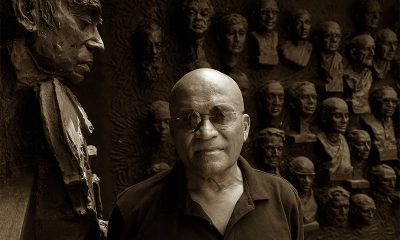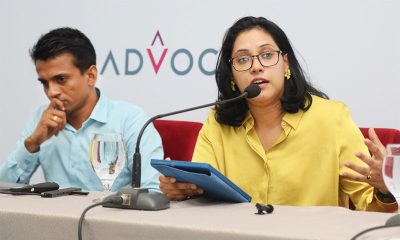Editorial
Praying for justice

Tuesday 9th March, 2021
The Black Sunday protest was a huge success. Thankfully, some politicians who sought to make political capital out of the event failed in their endeavour. It became a people’s agitation campaign led by religious dignitaries. Their message was loud and clear; they are deeply disappointed at the outcome of the presidential commission probe into the Easter Sunday terror attacks. The government had better heed their voice and act accordingly instead of trying to take cover behind the flawed presidential commission report, which says so little in so many words.
It was heartening to see many members of other religious communities standing shoulder to shoulder with the Catholics, on Sunday, and calling for justice. Unity is the best form of defence against terrorism. People must sink their differences, religious, ethnic, political or otherwise, and unite against all acts of terrorism. The victims of terror must be reassured and helped rebuild their lives. If only religious leaders and members of the public had come out in a similar manner and protested against LTTE terror attacks on places of worship and members of the clergy.
The LTTE massacred 146 Buddhist devotees at Jaya Sri Maha Bodhi (1985), 37 novice Buddhist monks at Arantalawa (1987), 147 Muslims praying in the Kaththankudi mosque (1990), 109 Muslims attending prayers in the Palliyagodella mosque (1991), and 17 Buddhist devotees at Sri Dalada Maligawa (1998), which suffered extensive damage when the LTTE exploded a truck bomb. There were many other terror attacks on civilians, but those crimes went unpunished.
At present, protests are being held to pressure the government to identify a bunch of terrorists. This demand is nothing but fair. Those savages must be traced and made to pay for their sins. However, the identities of those who masterminded many terror attacks before 2009 were known; curiously, there was no national campaign as such to have them punished. Interestingly, the SJB notables are pressuring the government to expose the forces that were behind the Easter Sunday carnage. Their right to do so cannot be questioned, but the fact remains that all of them, save a few including Sajith Premadasa, did not call for action against the LTTE for civilian massacres and high-profile assassinations. Some SJB grandees who were in the UNP-led Opposition, during the war, even went all out to dislodge military operations against the LTTE; they strove to defeat budgets in Parliament and bring down the then Rajapaksa government in a desperate bid to scuttle the war effort. Had they succeeded in doing so, the LTTE would have survived and many more terror attacks like the Easter Sunday bombings would have happed during the last 12 years or so. One of them even declared in Parliament that any fool could fight a war and urged the then government to opt for negotiations with the LTTE!
Among those whose lapses helped the NTJ terrorists strike with ease are former President Maithripala Sirisena, former Prime Minister Ranil Wickremesinghe, former Defence Secretary Hemasiri Fernando, former IGP Pujith Jayasundera and several key intelligence officers. The blame for serious security failures at issue should also be apportioned to those who were in the yahapalana Cabinet. But they will pose no danger to national security or public safety even if they manage to get off scot-free. But the masterminds of the Easter Sunday terror strikes remain a grave danger and hence the need to give priority to the task of tracing and dealing with them. The country will not be safe as long as they are at large. People who abhor terrorism expected the Easter Sunday PCoI to dig deep enough and expose those who were behind the bombings so that action could be taken against them and threats to national security neutralised. Therefore, it is only natural that the PCoI report has come as a huge disappointment for them.
Perhaps, the only way out is for the government to order another probe to find out who masterminded the Easter Sunday carnage and make use of the findings and the recommendations of the presidential commission probe to prosecute those who failed to prevent the terror attacks.
Editorial
Voters taken for a ride again

Tuesday 23rd April, 2024
Old habits are said to die hard. Although the leaders of the incumbent dispensation promised to heed the resentful youth’s strident call for a ‘system change’, in 2022, and mend their ways, they have, true to form, reneged on their pledge and shown signs of a relapse into the previous mode of behaviour, if the manner in which they are conducting their election campaigns is anything to go by.
Sri Lankan politicians, like their Indian counterparts, have earned notoriety for handouts-for-votes schemes. The SLPP-UNP government has embarked on a campaign to curry favour with poor voters by distributing free rice, state-owned lands/houses, etc. The people are being bribed with their own money, again! The distribution of free rice is likely to continue until the upcoming presidential election.
President Ranil Wickremesinghe is traversing the country as if there were no tomorrow, giving away rice, distributing title deeds for state land, and making various promises, obviously with an eye to the next presidential election. The UNP politicians who suffered ignominious electoral defeats in 2020 are trying to come in from the cold by taking part in the free rice distribution ceremonies, which must be costing the public more than the rice stocks being given away. Shouldn’t they use their personal funds, most of which were raised while they were in power, to grant relief to the public and gain political mileage?
The SJB is also giving away things. It says it is using its own funds for its vote-catching welfare programmes; however, it ought to reveal where funds for such projects come from. All political parties ought to maintain utmost transparency about their funds and transactions if they are not to be accused of benefiting from the largesse of unsavoury characters, who use their black money to bankroll political campaigns. None of them care to do so. Instead, they accuse each other of corrupt practices.
The JVP does not believe in giving; it only receives donations including designer clothes for its leaders, whose sartorial elegance seems to compare favourably with that of the young members of the Medamulana family. It has not even given back to the people what it grabbed from them during its reign of terror in the late 1980s. It should at least return their national identity cards!
The SLFP ought to curtail its expenditure and utilise the savings to enable its leader, Maithripala Sirisena, to pay compensation to the Easter Sunday victims in keeping with the Supreme Court order for his pathetic failure to prevent the terror attacks in 2019.
The practice of politicians doing political work at the expense of the public must end forthwith. There is absolutely no need for the President or the ministers or the members of the UNP to attend the rice distribution ceremonies. In fact, there must be no ceremonies at all. The distribution of free rice can be done through the Divisional Secretaries, Grama Niladhari and other state employees. That is what public officials are there for.
Equally, the public must not be made to pay for the Opposition Leader’s transport and security when he conducts political campaigns. The same goes for the ministers running around like headless chickens. A state minister’s official vehicle caught fire recently while he was zipping about in his electoral district to attend Avurudu sports events. He was not doing any official work, and therefore the cost of the fire-damaged vehicle must be recovered from him.
Whenever useless state functions are held in faraway places, to boost the ruling party politicians’ egos, the President, the Prime Minister, Ministers and military bigwigs fly there in separate helicopters, and the public has to foot the bill. They must be made to pay for such chopper rides from their personal funds.
Today is Bak Full Moon Poya Day. Politicians who live off the public, flaunt what they make out to be their piety, and sermonise, on days of religious significance. Let them be urged to make a resolution today to cease to be a burden on the hapless public, who are practising austerity and struggling to keep the wolf from the door.
Editorial
Dead or unborn debtors

Monday 22nd April, 2024
A woman has recently been arrested in Brazil for taking a 68-year-old man, who had been dead for hours, to a bank in Rio de Janeiro to obtain a loan. She pretended that the dead man, whom she kept calling uncle, was seriously ill, but wanted a loan, according to media reports. Thankfully, she could not dupe the bank employees, who alerted the police.
Perhaps, what the Brazilian woman is reported to have done in a bid to draw a loan pales into insignificance in comparison to how Sri Lankan politicians obtain loans, parts of which end up in their deep pockets. Even if she had succeeded in her endeavour, her racket would not have affected the borrower, who was dead. Our political leaders have no history of taking corpses to banks, but they do something worse; they obtain massive loans at the expense of the unborn. It is the future generations that will have to pay back the loans to the tune of billions of dollars the present-day leaders have been drawing recklessly over the past several decades. Debt restructuring will make the burden on future generations even worse.
What had caused the death of the man who was taken to the Brazilian bank posthumously was not known at the time of writing. In this country, banks and loan sharks, including the so-called microfinance companies, cause the deaths of some of their customers, who lose all their assets when they fail to pay back loans at exorbitantly high interest rates.
The microfinance creditors do not give up their efforts to recover loans even after their borrowers commit suicide. They demand monthly interest payments from the families of the victims of predatory loans. Instances abound where the hapless borrowers lose their valuable assets, such as houses, vehicles and even land, pledged as collaterals for loans and are reduced to penury and/or left with no alternative but to take their own lives. Sri Lankans are not alone in this predicament. Their counterparts in other developing countries are also preyed on by loan predators, who operate with impunity because they have huge slush funds, and politicians benefit from the largesse.
The aforesaid Brazilian woman is facing legal action, we are told. But our politicians who are borrowing heavily at the expense of the unborn, and the loan sharks who drive their borrowers to suicide are going places. What a world!
It’s pricing formulae, stupid
The Trade Ministry has reportedly decided to introduce a pricing formula for building materials as part of a strategy to give a boost to the construction industry, which is in crisis. This may look like a sensible move on the face of it, but the question is whether the Trade Ministry will be able to achieve its goal. It has failed to accomplish even a simple task like regulating egg prices, which have gone into the stratosphere. Minister of Trade Nalin Fernando has been bellowing rhetoric and issuing warnings and even threats in a bid to rein in the errant egg traders, but in vain.
The public has lost faith in pricing formulae. Last month, this newspaper quoted Chairman of the Committee on Public Finance, Dr. Harsha de Silva, as having said that the Trade Ministry had disregarded the milk food pricing formula much to the detriment of consumers’ interests.
SJB MP and former Minister of Power and Energy Champika Ranawaka has reportedly said the government is making unconscionable profits by keeping fuel prices artificially high. If so, the foreign companies in the fuel retail trade must also be making a killing.
One can only hope that Ranawaka will work out the actual fuel prices and reveal them to the public soon. The government must be manipulating the pricing formula to jack up fuel prices. This is something the Opposition must take up in Parliament and ratchet up pressure on the government to explain. If the price of diesel can be reduced significantly, the cost of transport and power generation will decrease much to the benefit of the general public and the industrial sector.
Editorial
A.T. Ariyaratne: Death of a colossus

The death last week of Dr. A.T. Ariyaratne, who founded and led the Sarvodaya movement in Sri Lanka after a long life of 92 years, has robbed the country of a colossus of his generation. His own name, as well as that of the organization he created is very well known to everybody in all homes across the length and breadth of the country. A small made, soft spoken personality with a shock of white hair and an ever present smile, he had a face that could best be described by the Sinhala word seedevi with all its many connotations. It reflected his inner calm, non-violent disposition and Gandhian values. The origin of the name Sarvodaya can be traced to Sanskrit roots – sarva (all) and udaya (uplift). Mahatma Gandhi, whose footsteps Ariyaratne sought to follow, saw it as “uplift for all.”
Ahangamage Tudor Ariyaratne was a teacher at Nalanda College, Colombo, when he founded Sarvodaya in 1958. He had taken a group of 40 schoolboys and 12 teachers from Nalanda to Kathaluwa, a Rodiya village of outcasts and beggars to help uplift conditions of people living there. From that small acorn, a mighty oak grew. By 1972, the growing demands of the fledgling organization compelled his retirement from the teaching profession and devote himself full time to the Sarvodaya Shramadana, a self-governance movement which among other things provides comprehensive development and conflict resolution programs to villages.The Internet says that as of 2006, “Sarvodaya staff people were active in 15,000 of 38,000 villages in Sri Lanka.” The organization estimated 11 million individual beneficiaries and financial reserves ran at Rs. 1.6 billion in that year.
Although well funded Non-Governmental Organizations (NGOs) like the Ceylon School for the Deaf and Blind and the Ceylon (later Sri Lanka) Red Cross have been around longer than Sarvodaya, the latter arguably became one of the best funded, if not the best funded NGO in the country. Ariyaratne’s commitment and simplicity impressed the donor community which staunchly supported his movement that grew exponentially from its grassroot begining. Obviously, the organization necessarily had to present professionally produced project proposals to donors and satisfy them that their money was well spent.
During the course of time, the needed skills and capacity to run an organization as big as Sarvodaya had become was acquired. The consciousness that donor support will not continue to flow forever necessitated the setting up income generating ventures, recruiting needed personnel and adequately remunerating them within a framework of relatively modestly paid grassroots workers. Balancing an equation such as this would have been no easy task but the organization appears to have succeeded in achieving its objective.
Sarvodaya’s presence in villages countrywide and the work it was doing made it a formidable political force. Rightly or wrongly it was rumoured at one time that Ariyaratne planned to run for the presidency. President Premadasa in 1990 set up a seven-member Commission of Inquiry (COI) including two retired Supreme Court judges (one of them headed the commission) and five other eminent persons to investigate NGOs and a variety of connected matters. This COI was assisted by counsel from the Attorney General’s Department and included a police investigation unit. It was widely perceived that Sarvodaya was specially targeted and the organization was compelled to pour resources and energy to defend itself. The International Commission of Jurists (ICJ) commented adversely on the methods adopted at the COI. Nothing eventually came out of the investigation.
Ariyaratne was awarded the country’s highest national award of Sri Lanka Abhimana by President Mahinda Rajapaksa in 2007. This award can be held by only five living persons at any time. Since he was awarded the Ramon Magsaysay Award for community leadership in 1969, awards and accolades have been poured on him from all corners of the globe. He was also nominated for a Nobel Prize. The esteem in which he is held was demonstrated by the state funeral accorded to him at Independence Square.
Letters to the Editor
We publish today two letters to the editor casting a light on the state of our nation. One of them written by an occasional contributor to our columns, pays a rare tribute to a public official. The writer lost a son at far away Buttala in what he has described as “unknown circumstances.” This resulted in a “somewhat complicated procedure entailing an exhumation, cremation and deposition of ashes.” Since the postmortem could not definitely establish the cause of death except for some extraneous substance found in his stomach, the coroner ordered that he be buried for at least three years and if necessary cremated thereafter.
The burial was in the Anglican section of Kanatte. The family being Buddhist wished a cremation at the end of the three years and the deposition of the ashes in the family vault in the Buddhist section. The letter writer has highly commended the Cemetery Manager for the assistance rendered. In a country where the norm is dissatisfaction about shoddy services from public and local government employees, it is heartening that there are exceptions to the ‘can’t care less’ attitude of many public servants and there are people who are willing to go public with commendations for exceptional services received.
The second letter was from a young Lankan who with her Dutch partner was on what she has called a safari to Yala. Their vehicle had hit a stray dog on the road and the driver wanted to proceed on their way as this was not an unusual occurrence. His passengers would have none of it and made him turn back to the dog lying with a broken pelvis on the roadside. They sought and obtained veterinary assistance and plan to take the animal back with them to the Netherlands where they have two other rescued dogs. The compassion demonstrated to an injured animal was truly heartwarming.
-

 Business3 days ago
Business3 days agoCEAT Kelani launches three new radial tyre variants in ‘Orion Brawo’ range
-

 Midweek Review7 days ago
Midweek Review7 days agoBetween abstraction and empathy in Sarath Chandrajeewa’s visual paraphrases
-

 Business7 days ago
Business7 days agoSOEs seen as failing SL’s ordinary citizens
-

 Business5 days ago
Business5 days agoDialog-Airtel Lanka merger comes centre stage
-

 Business7 days ago
Business7 days agoSri Lanka Tourism concludes another round of Roadshows in Australia
-

 Business5 days ago
Business5 days agoSLFEA appoints JAT as a Facilitation Partner for training painters to provide overseas employment opportunities
-

 Business2 days ago
Business2 days agoCeyline Travels and MBA Alumni Association of University of Colombo sign MOU
-

 Business3 days ago
Business3 days agoHayleys Fabric celebrates triple triumph at ISPO Textrends Spring/Summer 2026



























